The struggle of being an immigrant can be a challenging experience, but for many female immigrants, the struggle goes beyond the difficulties of adapting to a new country. In some cases, female immigrants find themselves held in prison under immigration powers, which can have a profound emotional impact on their well-being. In this blog post, I will tell you my story and explore the emotional struggles that I faced.
Female immigrants can be detained for various reasons, such as entering a country without proper documentation, overstaying a visa, or being sentenced for a crime.
While the reasons for detention may vary, the emotional toll it takes on these women is often similar. People can be detained in Immigration Removal Centres or in prisons, restricted by prison rules. At the end of a prison sentence, British people are released but those classed as “foreign”, are punished twice more for their crime. First with a prison sentence then with detention and potential deportation – regardless of their rights to stay in the UK.
Entering a prison for the first time is an overwhelming experience. The atmosphere is tense, the surroundings unfamiliar, and the uncertainty of what lies ahead certainly is daunting. Especially with all the movies, news about prisons’ life, I only can expect the worst.
Upon arrival at the prison, the registration process begins. This involves waiting for hours to be processed, surrounded by an oddly peaceful wallpaper that seems out of place in such a setting. You will undergo a comprehensive search, potentially including a strip search where you must remove all your clothing. Following that, you will be
seated in a specialized chair known as the BOSS chair, which ensures that no electronic or phone devices are concealed within your person.
I was shocked to see the chair, it looked like an electrocution chair from a horror movie. This process is humiliating and intrusive but you don’t have the option to refuse so it is best just to get on with it.
Your dignity is put to the test and your personal space is violated. The wait can be nerve-wracking, as anticipation builds for what is to come. After hours of waiting, I was finally given some large plastic bin bags to store my belongings. These bags become my only means of carrying personal items within the prison. I am now not who I am, I am a number, everyone there is a number.
The first night in prison can be likened to being in a psychiatric hospital. The sounds of doors banging, people crying, hauling and even laughter fill the air, creating an unsettling environment. The concept of time becomes blurred, as it is difficult to
determine when one arrived in this new world.
The cell itself is a far cry from the comfort of home. It consists of a bunk bed, a panel as a table, a sink and a toilet without a lid, both mounted in plain sight without any privacy door. The lighting is dim and flickering, adding to the overall gloominess of the space. The bedding provided is a smelly old duvet, devoid of any cover, and adorned with sanitary towels, countless stains that the next morning I discovered to be blood.
Surviving the first day in prison is undoubtedly a challenging feat. The unfamiliarity, lack of privacy, and unsettling atmosphere took a toll on my emotional well-being. I felt weak and distraught. I lost all my energy and fell asleep with tears in my eyes.
As the women wait in line for breakfast, I have a chance to meet my fellow inmates. This can be a daunting experience, especially for those who are new to the prison environment. The women come from diverse backgrounds and have their own unique stories to share. Some may have been in prison for years, while others may be serving shorter sentences or be remanding there.
It is not uncommon to encounter women who appear to be under the influence of drugs, with a greenish hue on their faces. Substance misuse is a prevalent issue within the prison system, and it can have a profound impact on the physical and mental wellbeing of the inmates. The sight of these women serves as a reminder of the challenges they face and the need for support and rehabilitation.
Additionally, you may come across women with tattoos covering their faces and bodies. Tattoos can hold significant meaning for individuals, and in prison, they often serve as a form of self-expression or a way to mark one's affiliation with a particular group. These tattoos can be a visual representation of the struggles and experiences these women have endured.
Understanding the daily routine of women in prison can also be very challenging. In theory, new inmates are supposed to have two induction weeks to get to know the regime.
However, in practice you will be locked behind doors more than 23 hours a day, most of the time with other(s). According to prison regulations, individuals are permitted to leave their prison cells for fresh air or personal hygiene for a minimum of 30 minutes each day.
However, staffing issues have a direct impact on how long you are allowed out of your cell so you have no idea when you will be allowed out and for how long.
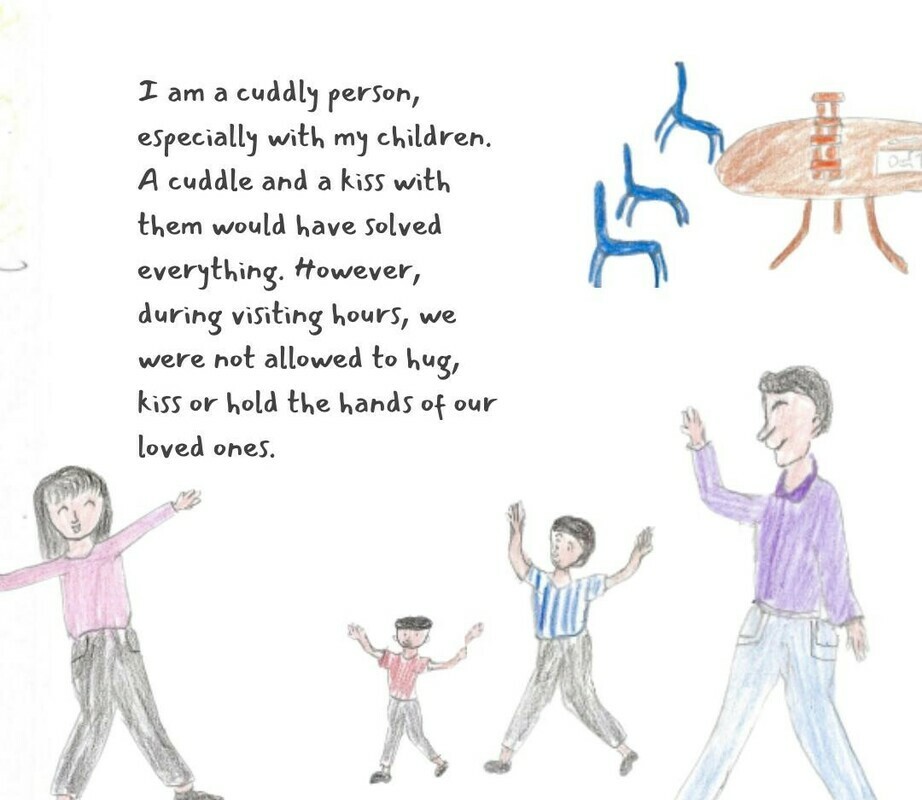
Being an immigrant in a foreign country can be challenging, but for female immigrants who find themselves in prison, the emotional struggles can be even more profound.
One of the most significant challenges they face is the feeling of isolation and loneliness.
They may feel cut off from the world and experience a sense of
abandonment. Female immigrants in prison often feel isolated due to a combination of factors. Firstly, they are separated from their families and support networks, which can be devastating for their emotional well-being. Additionally, language barriers can make
it difficult for them to communicate and connect with other inmates or prison staff. This sense of isolation is further exacerbated by cultural differences and the unfamiliarity of the prison environment.
I know this first hand. I am a cuddly person, especially with my children. A cuddle and a kiss with them would solve everything. However, during visiting hours, we are not allowed to hug, kiss or hold the hands of our loved ones.
Staff are not allowed to hug or have any physical contact with us and even those who have come to the prison specifically to comfort us, such as charity workers or priests, are not allowed either.
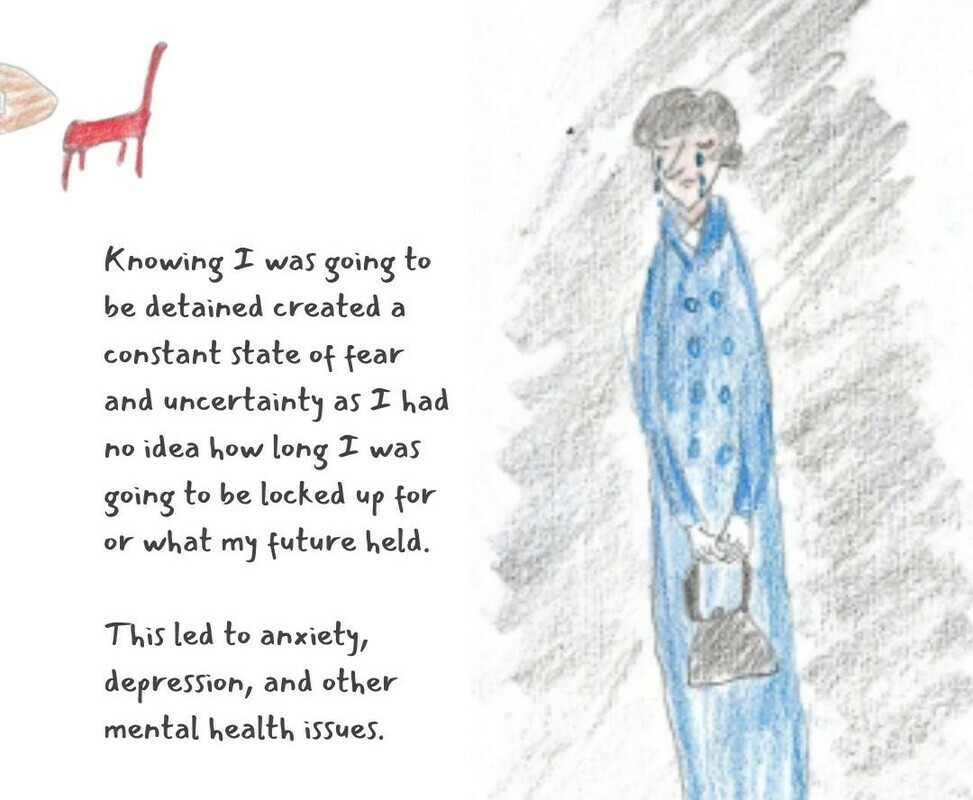
Being held in prison under immigration powers creates a constant state of fear and uncertainty as you had no idea how long was going to be locked up for or what my future held.
This fear and uncertainty lead to anxiety, depression, and other
mental health issues. It is like a sentence on top of another sentence but it is worse as you never know the release date.
For many female immigrants that I met, being detained in prison results in a loss of identity and dignity. Prisons have strict, punitive regimes and are not an appropriate place to hold people under immigration powers. Not only are you locked in a cell up to 23 hours a day but you are stripped of personal belongings and subjected to ridiculous rules and regulations.
For example, no one can store more than two packs of toilet tissue in their cells. You are talking about a prison full of women, from personal hygiene to cleaning we use tissue for everything and need more than two rolls a week.
If officers find more than two in a random search you will be notified of adjudication and have privileges taken away such as work, activities, TV, canteen money or phone calls, you can also be placed in total isolation.
Each prison has an incentives scheme called Earned Privileges or IEP and detainees are no exception. Your incentive level determines if there are extra things you can get to do.
There are currently three main Incentive levels -Basic, Standard, Enhanced.
In order to be an Enhanced prisoner, it would take about 12 weeks to “prove” yourselves and earn at least 3 positive IEPs.
With Enhanced status, I can have more visits in a month, and have more weekly spending money.
No one explained this to me and I did not know that. From the beginning, I was desperate for more than two visits per month and for more phone credit but I was not in jail for 12 weeks yet.
The guilt kills me every day. I was desperate, I hurt my loved ones, my children, my partner, my parents. I couldn't see a future, and the shame ate me alive.
I started to hurt myself and attempted suicide multiple times. I witnessed others self-harming and attempting suicide most days. It had become a norm sadly.
More than half of the women here have been sentenced for life. It has a higher proportion of prisoners serving life than any other British women’s jail.
Yet many here regularly cut themselves or try to commit suicide, leading to some twelve ambulance call-outs a month.
I witnessed people drinking hand-sanitisers and overdosing. Someone was battered by fellow prisoners with a garden hose, stones, a metal bar and a plank, leaving her with broken ribs, shoulder and wrist. This is not an appropriate place to hold people under immigration powers.
Female immigrants held in prison often face limited access to resources that can support their emotional well-being. Mental health services may be inadequate or non-existent, leaving these women without the necessary support to cope with their emotional struggles.
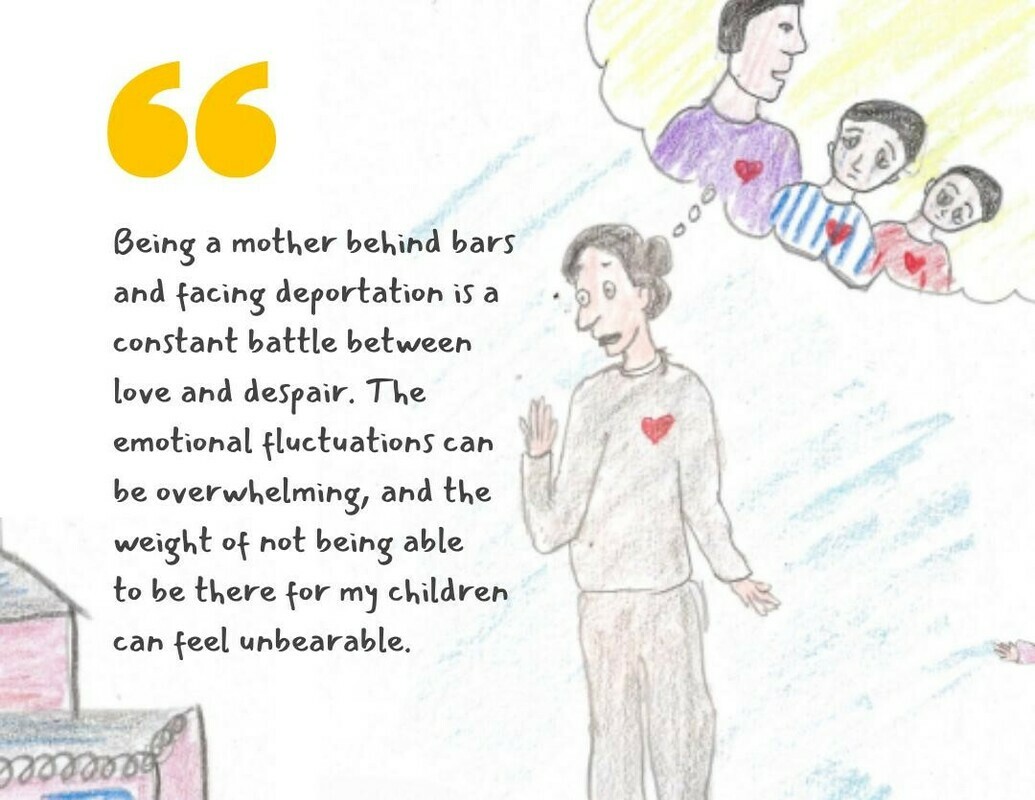
Being a mother behind bars is a constant battle between love and despair. The emotional fluctuations can be overwhelming, and the weight of not being able to be there for my children can feel unbearable.
Language and cultural barriers can further exacerbate the emotional struggles faced by female immigrants in prison. Communication may be difficult, making it challenging to express their needs and concerns. Additionally, cultural differences may result in
misunderstandings and a sense of alienation.
Where I was, there was only a handful of immigrants detained under immigration powers All of us speak different languages. But we look after each other when needed. We are united in our diversity, bound by our shared experiences, and driven by our dreams. Life in prison can be tough. The monotony, the isolation, the lack of freedom—it can really take a toll on a person.
But sometimes, in the most unexpected places, you find a glimmer of hope, a ray of sunshine amidst the darkness. For a group of immigrants like us, that glimmer came in the form of food and communication. When you're far away from home, the taste of
your mother's cooking can transport you back to a place of comfort and familiarity. We longed for that feeling, so we decided to chip in and create a makeshift canteen where we could try to assemble each other's traditional dishes.
It was a way to preserve our culture, to share a piece of home with one another. Food has a magical way of bringing people together. As we sat around the table, sharing our meals, we formed a bond that transcended language barriers and cultural differences. We laughed, we cried, we shared stories of our past and dreams for the future. In those moments, we were not just inmates—we were a family. Our body language became more expressive, more confident. We no longer needed words to understand each other. Many of our fellow immigrants were illiterate or struggled with English, making it difficult for them to navigate the complex world of immigration law, paperwork and applications.
I saw an opportunity to lend a helping hand. I became their translators, their scribes, their advocates. I filled out forms, wrote letters, and made sure their voices were heard. I felt like a black sheep, a stain on my family's reputation. The guilt and self-loathing were overwhelming, and I couldn't help but think that I didn't deserve to be my children's mother.
One of my biggest fears was the possibility of being deported. If that happened, my life would crumble before my eyes. My husband would divorce me, leaving me with no money, no job, and no chance of having custody of my children. The thought was paralyzing.
So, picture this: you're stuck in a legal limbo, anxiously waiting for your immigration bail hearing. It's like being on a never-ending rollercoaster ride, except you're not having any fun and there's no cotton candy in sight.
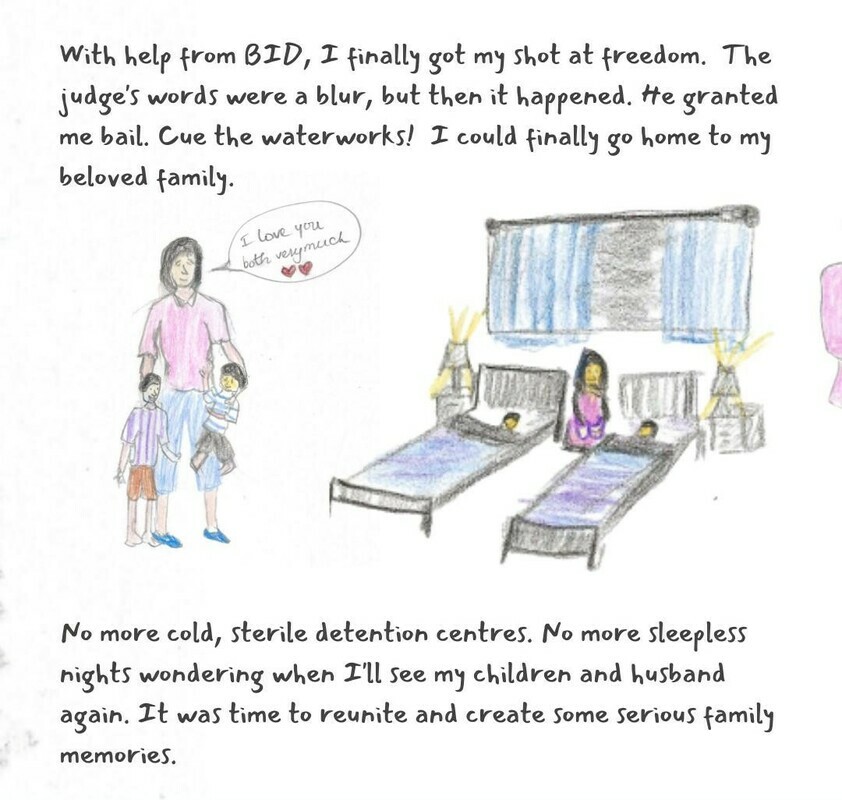
But fear not, my friend, because with help from BID UK (Bail for Immigration Detainees), I finally got my shot at freedom. There I was, sitting in the video room, feeling like a fish out of water. The judge's words were a blur, but then it happened. He granted my bail. Cue the waterworks! I couldn't hold back the tears, and neither could one of the prison staff members sitting beside me. We cried together, like a couple of emotional wrecking balls. With the judge's decision, I could finally go home to my beloved family. The feeling was indescribable, like a weight had been lifted off my shoulders. No more cold, sterile detention centers. No more sleepless nights wondering when I'll see my children and husband again. It was time to reunite and create some serious family memories.
Now, I know what you're thinking. "But wait, what exactly is a bail hearing?" Well, my friend, let me break it down for you. A bail hearing is like a golden ticket to freedom. It's a chance for the judge to decide whether you can be released from detention while your case is ongoing. And let me tell you, that decision can make all the difference in the world.
Thanks to BID UK, I had the support and guidance I needed to navigate the legal maze. They were my guardian angels, swooping in to save the day. Without them, I would have been lost in a sea of legal jargon and paperwork, at the worst my life. They were my go-to resource, answering all my questions and providing a shoulder to cry on (literally).
Now, I'm back where I belong, surrounded by the people I love. The journey wasn't easy, but with a little help and a lot of determination, I made it through. So, if you're facing a bail hearing, remember that there's hope. And who knows, you might just find yourself shedding tears of joy, just like I did.
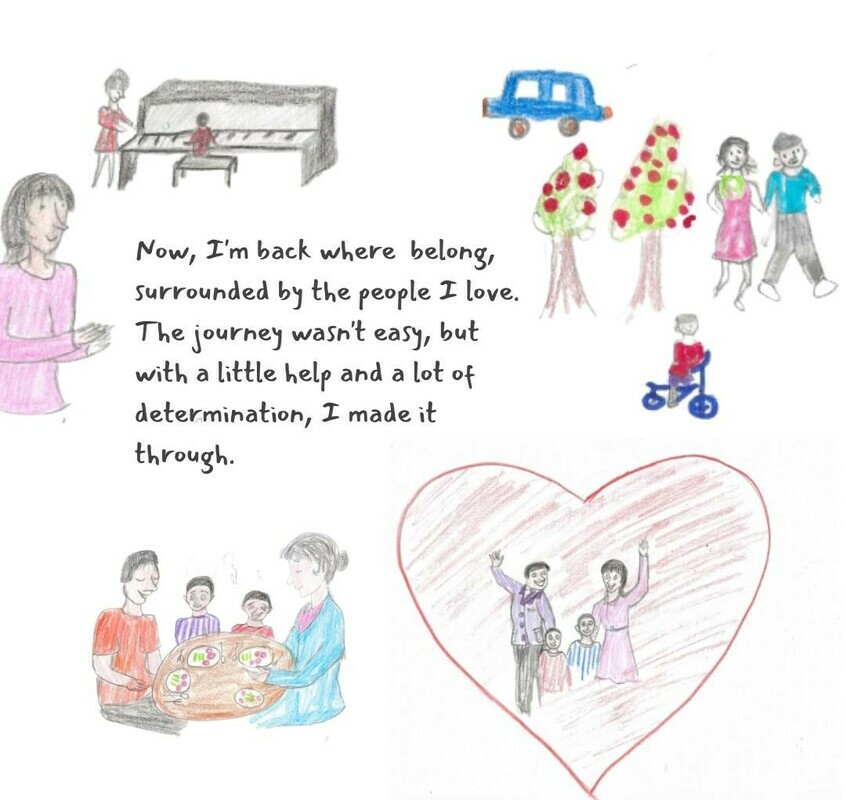
*We have used the pseudonym Eve at the authors request.
Eve is currently developing the drawings she made for her children which she was detained (pictured here) into a children's book to help others in the same situation. Watch this space for more news on that soon.




